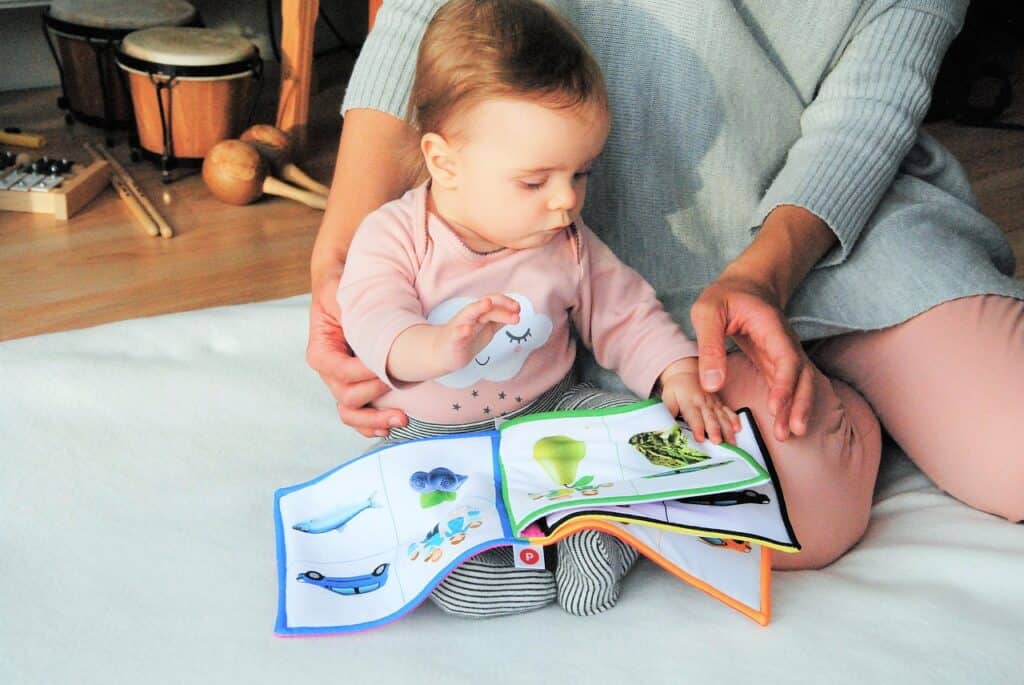Shared reading is one of the best activities parents and caregivers can choose to do with their children. One on one reading time truly nourishes a child’s ability to learn, read, think, and imagine.
As a Speech-Language Pathologist, reading for pleasure is one of the first recommendations we make to families. The benefits are countless, and for children with specific speech and language goals, books are a great way to target those goals in a fun, engaging and meaningful way.
Read on for some helpful tips for reading with your children. Remember, the only wrong way to read to your children is to not read with them. Have fun!
1. Stories Aren’t Only for Bedtime!
Incorporate book reading into other times of the day when your child will have more energy. Try reading waterproof books together in the bath or while waiting for the bus on a rainy day!
2. Lots of Pictures is Best for Preschoolers
Young children are drawn to books with lots of pictures. You can even try a wordless picture book to see if your child can create a story of their own.
3. Children Love Your Silly Voices
Worried you’ll feel silly reading a children’s book out loud? Don’t be! Your child will love your silly voices. Exaggerating certain words will help your child learn the meaning of words and is a wonderful way for your child to clearly hear every sound in a word.
4. Be Repetitive, Predictable and Repetitive.
Don’t be afraid to read the same books over and over and over. Predictability and repetitiveness is very helpful for children’s learning. If you’re tired of the same old story lines, see if your toddler can fill in the gaps. He huffed and he puffed and _____________! If they know it all, tell them you want them to read it to you this time.
5. Follow Your Child’s Lead
Help your child develop a love for reading through a first love of story time. Get cozy, laugh, and let your child take the lead with book reading. Do they want to skip to the end? Fine! Do they not care to hear the story, but want to point to all the cats? Great! Make shared reading a time to nurture their desire to explore reading their own way.
6. Keep it Low-Tech When Reading To Your Child
Anything to avoid? Since you asked…Stick to paper books or books with pages. Electronic books for children have shown to lead to less learning due to too many distractions (buttons, sounds etc.)
Now that you have some fresh tips for reading time, read on for two of the most common speech issues that reading can help with: Trouble saying R, and Prepositions.

Trouble saying ‘R’:
If your child has difficulty pronouncing the R sound, you can bring extra attention to this sound while reading. Being able to hear the sound is the first step to being able to produce it, so dig deep into words that have R, especially on the end of words where the R tends to disappear completely!
For extra practice, you can have your child repeat the word after you.
Best books to target R?
Over and Under the Pond by Kate Messner
We’re Going on a Bear Hunt by Michael Rosen
Rodney the Rat by Valerie Ann
Robert the Rose Horse by Joan Heilbroner
Harriet’s Horrible Hair Day by Daen Lesley Stewart
Trouble with Prepositions:
If your child has a difficult time describing the location of items (up, over, next to, behind, etc.) books can be a fantastic way to teach and reinforce these tricky words. Once you’ve read a page, talk about what your child sees in the picture. Use the target words as often as repeatedly as possible:
I see a cat on the fence.
There’s a squirrel running up the tree.
The boy is next to the house.
Alternatively you can pick books that specifically target prepositions to make your job even easier! Use a favourite toy or stuffed animal or your child’s body to act out the story to make real life connections to preposition words:
There’s a teddy on your head!
Teddy likes sitting next to you.
Teddy wants to sit behind you!
When reading to children, remember to target expressive language (talking), too! Ask questions like, “Where’s teddy now?”
Best books to target prepositions?
Around the House, the Fox Chased the Mouse by Rick Walton
We’re Going on a Bear Hunt by Michael Rosen
If you were a Preposition by Nancy Loewen
If you would like individualized book reading strategies or other parent coaching tips, get in touch with Arbutus Speech Therapy today or book a free consultation to get started with speech therapy sessions.
Arbutus Speech Therapy uses the Hanen program. Hanen has more information about the benefits of book reading here.

